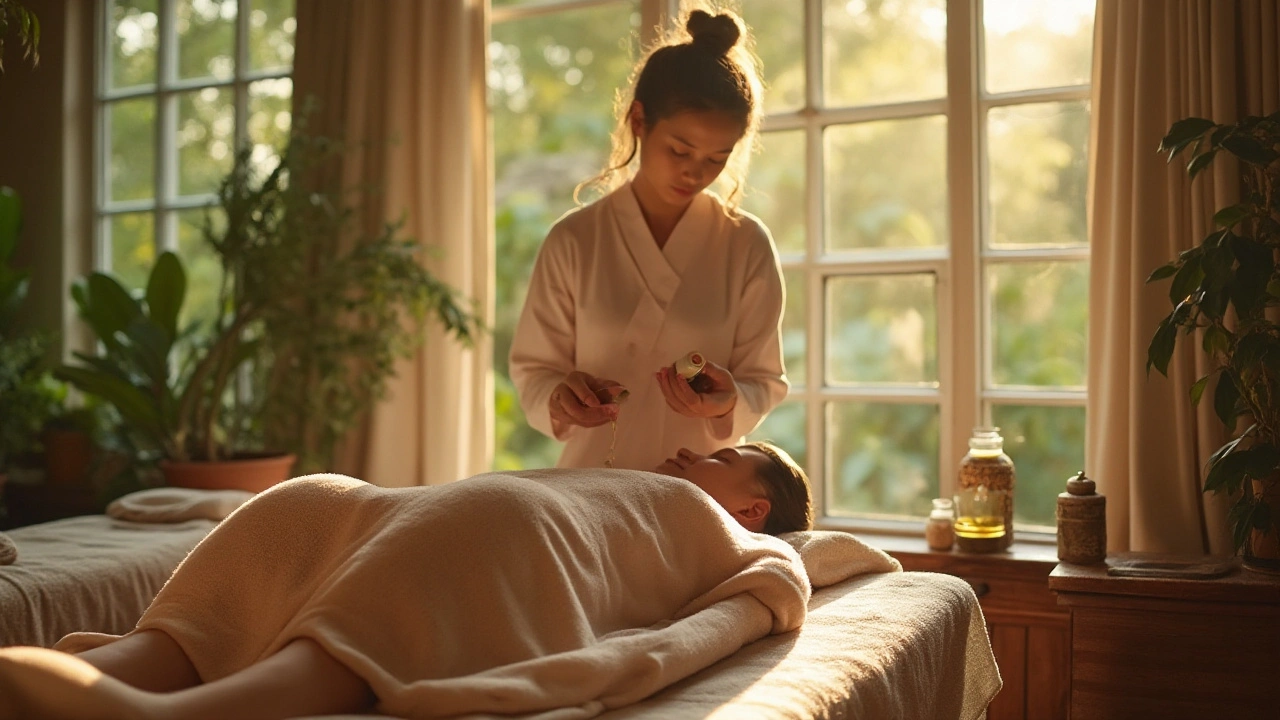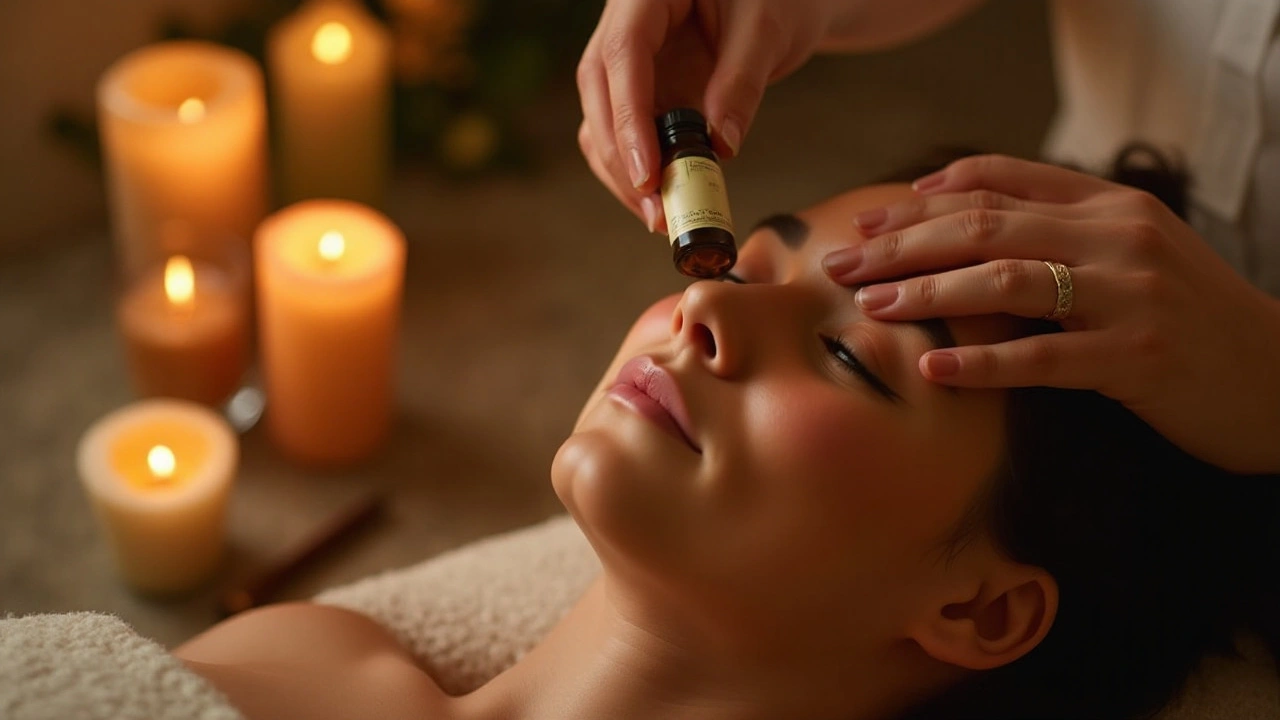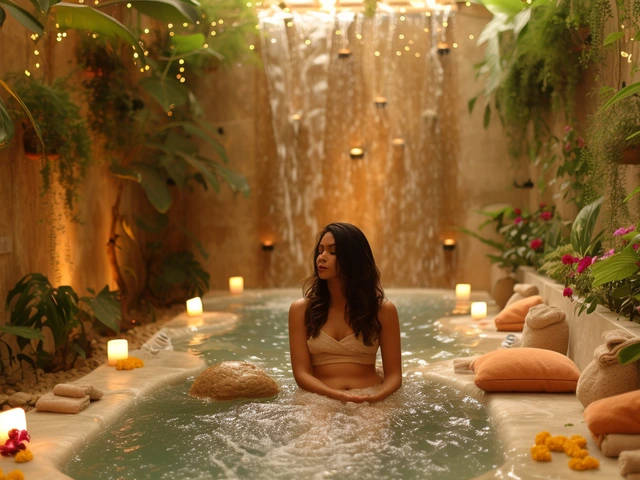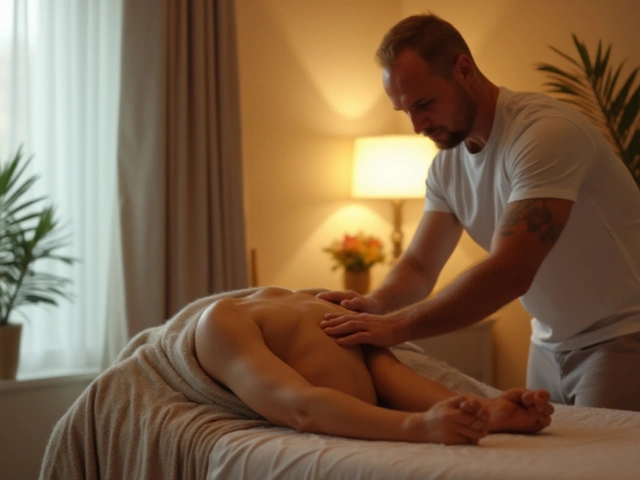Enhance Your Mental Well-Being with Ayurvedic Massage Techniques

Ayurvedic massage, steeped in a tradition that dates back thousands of years, is more than just a method of relaxation—it's a journey towards achieving a balanced mind and body. This ancient Indian practice combines the wisdom of soothing touch and the power of herbal oils to not only rejuvenate the physical self but also to uplift the mental state. By harmonizing vital energies, it serves as a holistic remedy for many modern mental health challenges.
In today's fast-paced world, stress and anxiety seem to lurk around every corner. Thankfully, Ayurvedic massage offers a natural and nourishing pathway to discover inner peace and mental clarity. Through gentle manipulation of pressure points and specific techniques tailored to individual needs, it helps to melt away the tension and restore equilibrium. Understanding this approach could be a valuable addition to anyone's self-care routine, promising tranquility and mental resilience.
- The Philosophy of Ayurveda
- Understanding Ayurvedic Massage Techniques
- Benefits for Mental Health
- Choosing the Right Oils and Ingredients
- Incorporating Ayurvedic Massage in Daily Life
- Consulting with Ayurvedic Practitioners
The Philosophy of Ayurveda
Ayurveda, often described as the science of life, is a holistic approach to health that originated in India over 5,000 years ago. Unlike many modern medical systems that target specific symptoms, Ayurveda focuses on creating a balance between the mind, body, and spirit. This ancient philosophy emphatically identifies the universe as one unified entity, where everything is interconnected. At the core of Ayurveda are the doshas, which are biological energies found throughout the human body and mind. Vata, Pitta, and Kapha are these energies that govern all physical and mental processes, and understanding an individual's unique dosha composition is fundamental to maintaining health.
Knowledge of the doshas allows practitioners to personalize treatments and recommendations. For example, Vata is linked to air and space, and if imbalanced, it can cause anxiety and restlessness. An Ayurvedic massage can help soothe an aggravated Vata dosha, promoting mental calmness. As an ancient text, Charaka Samhita wisely notes, "He who contemplates on his mind, speech, and actions is the knower of the Self." This introspective foundation strengthens the emphasis on self-awareness and personal harmony in Ayurveda. The traditional practice leans on extensive natural remedies, including spices, herbs, and massages, aimed at nurturing and balancing these energies.
Ayurveda doesn’t just manage diseases, it encourages preventing them through lifestyle changes and natural interventions. By employing dietary guidelines and daily routines, it fosters harmony and vitality. The system stresses the importance of aligning with nature's cycles, advocating for early sleep and rising with the sun. With each meal and movement harmonized with one's dosha, the body and mind are rejuvenated over time. Modern research supports these practices, stating that the circadian rhythm heavily influences mental health. An evidence-based approach underlines the effectiveness of Ayurveda in not only treating but also in preventing stress-related disorders and enhancing emotional well-being. This demonstrates its enduring relevance in today's world.
Understanding Ayurvedic Massage Techniques
At the heart of Ayurvedic massage lies the profound belief that touch therapies can heal both the mind and body by harnessing the flow of energy. Each technique is thoughtfully designed to balance the three doshas—Vata, Pitta, and Kapha—which are essential elements governing our physical and mental conditions. To achieve this equilibrium, the practice employs a variety of methods that aim to nurture, detoxify, and rejuvenate our holistic selves. The techniques used are as diverse as the ailments they soothe, stemming from a profound understanding of human anatomy married with spiritual awareness.
The most common type of Ayurvedic massage, Abhyanga, uses ample amounts of warm herbal oils tailored to the individual's dosha requirements. This method promotes harmony by allowing the oil to penetrate deeply into the skin, loosening toxins and relieving muscular tension, which in turn soothes the mind and spirit. The rhythmic motions, often in synchronization with specific breathing patterns, contribute to lowering stress levels, allowing mental clarity to emerge. A study highlighted by the Journal of Ayurveda and Integrative Medicine noted that regular practice of Abhyanga significantly reduced stress markers, presenting a viable alternative to conventional stress management techniques.
Specialized Techniques for Mental Wellness
Another technique known as Shirodhara involves the steady pouring of warm oil on the forehead, specifically stimulating the Ajna Chakra, also known as the 'third eye.' This is especially effective for those experiencing sleep disturbances, anxiety, or headaches. The repetitive motion of oil flow induces a state of deep meditative relaxation, fostering a serene mindscape where creativity and positive thoughts can flourish.According to Ayurvedic practitioner Dr. David Frawley, 'Shirodhara brings the energy back to the spirit, restoring peace and emotional balance.'
The Role of Marma Points
Another element integral to Ayurveda is the strategic use of Marma points—vital energy points that correlate with our internal organs and emotional centers. By applying gentle pressure to these points during massage, energy blockages are released, enhancing the flow of prana or life force. This practice not only alleviates physical discomfort but also promotes mental clarity and emotional emancipation. For instance, working on the Marma points at the base of the neck is believed to release built-up stress, thereby easing the burdens on the mind.While many of these techniques require trained hands, some simple practices can be adapted for home use, offering daily stress relief and heightened mental focus. Incorporating these practices into modern life is not just about alleviating immediate stressors but about cultivating a lifetime of mental health wellbeing. Understanding and embracing these techniques could be a significant step towards leading a more balanced and fulfilled life.

Benefits for Mental Health
Discovering the wonders of Ayurvedic massage unveils a world where ancient techniques deliver more than transient relaxation; they provide profound benefits for mental health. This tradition works on the premise that emotional and mental well-being arise from balanced energy systems in the body. Unblocking and channeling these energies through massage can lead to immense relief from stress and anxiety, which are ever-present in our hectic modern lives.
By utilizing specific oils and touch methods, this massage encourages the release of toxins and enhances circulation, facilitating a deep sense of tranquility and clarity. It is especially beneficial for those struggling with depression, as it can naturally stimulate the release of endorphins, promoting feelings of happiness and contentment. A study published in the Journal of Alternative and Complementary Medicine points out that regular Ayurvedic massage can significantly decrease cortisol levels, the hormone associated with stress, thus improving one's mood significantly.
There's something uniquely personal about the experience as well. Each session is tailored to the individual's constitution, addressing specific imbalances. This customization is pivotal in maximizing its mental health benefits. The mind, often heavy with burdens, finds solace as delicately chosen oils and rhythmic movements work in tandem to heal wounds both seen and unseen. A grounded mind emerges, primed for facing daily challenges with renewed vigor.
"The mind is the seat of consciousness, and its tranquility can lead to a life of balance." - Dr. Vasant Lad, a renowned Ayurvedic practitioner.
Moreover, Ayurvedic massage assists in better sleep quality, which is a cornerstone of mental health. By stimulating the production of melatonin, it aids in establishing a healthy sleep cycle, thus allowing the brain to rest, rejuvenate, and reset. This restful sleep, in turn, reinforces positive thought patterns and emotional resilience, breaking the cycle of insomnia-induced stress. The overall mental fortitude that comes with regular sessions is not merely anecdotal; practitioners and recipients alike endorse its transformative power.
Yet, the efficacy of massage therapy in enhancing mental peace doesn't stop here. It also encourages mindfulness, fostering a deep sense of presence and connection with oneself. This meditative state, achieved through nurturing touch, helps in steering away from worry and fear, and instead, fosters a deeper sense of gratitude and perspective. Incorporating these practices regularly can essentially shift one's mental landscape, making it fertile ground for growth and positivity, just by nurturing the mind-body connection.
Choosing the Right Oils and Ingredients
The essence of an Ayurvedic massage lies not only in the techniques utilized but also critically in the selection of oils and ingredients. These natural elements are the cornerstone of the practice, able to significantly impact the mind and body through their distinct properties. Each oil is chosen to balance the three doshas—Vata, Pitta, and Kapha—which are forces believed to define a person’s physical and biological makeup. Understanding which oils cater to your specific needs can trickle the very essence of nature’s healing powers into your mental wellness journey.
When selecting the right oils, it’s important to first gain some knowledge about your dosha constitution. For someone with a predominant Vata dosha, oils like sesame or almond are recommended due to their warming nature, which is comforting for cold, dry characteristics associated with Vata. On the other hand, a Pitta-dominant individual may find relief in cooling oils like coconut or olive that help soothe the fiery nature. Lastly, Kapha dosha types benefit from lighter oils like mustard or safflower, which can help stimulate and energize the often sluggish and heavy feelings.
Supplementing oils with specific herbs enhances their effects. Adding rosemary or lavender to your massage oil can uplift mood and reduce stress levels. Turmeric-infused oils might deter skin inflammations and enrich the glow, promoting emotional well-being alongside physical benefits. The process of mixing these ingredients should be one of intention and mindfulness, as Ayurveda emphasizes the energies transferred from the hands to the oil itself.
"The best approach in choosing your oils is aligning them with your personal dosha and current mental state. This personalized attention ensures the massage is not only therapeutic but also deeply rejuvenating." — Vasant Lad, Ayurvedic Physician
Remember that the oils and herbs chosen also need to align with other personal preferences such as scent and texture, which could enhance the relaxation experience. Ultimately, these ingredients are more than just scents or textures; they symbolize a deep connection with Earth’s offerings, providing a bridge from physical to spiritual healing. Engaging your senses through touch, smell, and sight is perhaps one of the most potent ways Ayurvedic massage fosters holistic healing.

Incorporating Ayurvedic Massage in Daily Life
Bringing the ancient practice of Ayurvedic massage into your everyday routine can significantly enhance both your physical and mental well-being. You don't need to visit a spa each time; many techniques can be performed in the comfort of your own home. Consider starting your day with a self-massage known as Abhyanga. This involves applying warm oil to your body, which not only nourishes the skin but also helps in grounding the mind. The act of massaging oneself serves as a ritual of self-love and care, allowing you to connect deeply with your body. It's not just about relaxing your muscles—it's about setting an intention for a calm and balanced day. As you perform these movements, your mind tunes into each sensation, fostering a sense of tranquility.
To truly benefit from Ayurvedic massages, one must also understand the role of Doshas—Vata, Pitta, and Kapha—which are unique energy types defined in Ayurveda. Your Dosha influences how and where stress manifests in your body. Identifying your Dosha can help tailor your massage technique, ensuring it meets your personal needs. Many people find that integrating a brief session of pranayama, or breath control, before the massage session can further amplify its calming effects. By focusing on deep, deliberate breaths, stress dissipates, making way for peace and clarity. This harmonious blend of breath and touch can be transformative, even if practiced for just a few minutes each day.
The selection of oil is another key aspect of Ayurvedic massage. Sesame oil is often recommended for its warming properties, making it ideal for those with a Vata imbalance, characterized by anxiety and dry skin. Meanwhile, coconut oil provides a cooling effect that can pacify the fiery nature of Pitta Dosha. No matter your Dosha, always warm the oil gently on low heat before applying it to your skin, as the warmth can penetrate deeper into the tissues, amplifying its therapeutic effects. Do this practice in a serene place, perhaps setting the mood with soft music or aromatherapy to enrich your experience. Even dedicating fifteen minutes can yield profound shifts in your mental state.
Consistency is pivotal when integrating Ayurvedic techniques. Identify a time that suits you best—often, early in the morning or before bed are opportune moments. Treat this time as sacred, a deliberate pause in your day where stress cannot intrude. If possible, encourage family members to participate; children often benefit immensely from this practice, learning early on the importance of mindful self-care. This shared experience can foster deeper bonds and a more harmonious household. Ayurvedic massage doesn’t demand grand gestures or setups; it's the simplicity and dedication to the practice that creates lasting change.
For those keen on grasping the nuances, seeking advice from an Ayurvedic practitioner can be enlightening. As mentioned by Dr. Deepak Chopra, a respected voice in holistic medicine,
"Ayurveda enhances mental well-being by aligning the body and mind; it's a daily reminder that health is more than the absence of illness."Use this guidance to explore deeper into Ayurvedic teachings, uncovering new dimensions of health that extend beyond conventional practices. This journey is personal yet ever-evolving, offering invaluable insights at every turn.
Consulting with Ayurvedic Practitioners
When you begin your journey into the world of Ayurveda, seeking guidance from a professional practitioner can be invaluable. These experts in ancient Indian healing have devoted years to understanding the intricate balance of the body’s energies, known as doshas. Understanding your dosha type—Vata, Pitta, or Kapha—can help tailor a personalized approach to your wellness. Meeting with an Ayurvedic practitioner involves discussing your lifestyle, diet, emotional well-being, and specific health challenges. This holistic viewpoint allows them to propose a massage routine that benefits not only your physical health but also your mental well-being. Many people find that just talking through their issues with someone who listens deeply can be therapeutic in its own right.
An often-overlooked aspect of Ayurvedic consultations is the personal attention you receive. Unlike some modern medical appointments that feel hurried, an Ayurvedic session often lasts an hour or more. During this time, the practitioner will methodically assess your pulse, examine your tongue, and evaluate your skin. These small examinations offer huge insights into your health according to Ayurvedic principles. This initial assessment forms the basis of a tailored treatment plan that may include specific massage therapy techniques, medicinal herbs, or dietary adjustments. There's a growing interest in these practices in the Western world, and many practitioners here are now combining traditional Ayurvedic insights with modern wellness trends to provide well-rounded support.
It's crucial to work with a certified practitioner. In countries like India where Ayurveda is regulated, practitioners undergo rigorous training before becoming certified. However, this may not be the case everywhere. You can check credentials by looking for certifications from recognized Ayurvedic institutions. Personal referrals can also be instrumental in finding a trustworthy practitioner. Visiting an Ayurvedic massage therapist comes with its own set of questions. What kind of experience do they have? Are there particular ailments they've had more success with? Such queries can set your mind at ease, ensuring you're in good hands.
Many practitioners emphasize the importance of using authentic herbal oils optimized for mental health benefits. Some popular choices include Brahmi oil known for its calming effects, and Ashwagandha oil which is said to relieve stress. One might hear quotes from practitioners like,
"The touch of Ayurveda reaches beyond the skin, and taps into your mind, restoring harmony in an ever-busy world,"illustrating the deep belief in this ancient system’s ability to heal. While many have reported improvements in mental clarity and reduced anxiety after regular Ayurvedic massages, it's important to remember results can vary based on individual conditions and adherence to the recommended regimen.
For those curious about precise data, a study conducted by the University of Maryland Medical Center found that those who integrated Ayurvedic treatments noticed a significant reduction in stress levels. This statistic underlines the term 'holistic' as not just a buzzword, but a tangible approach to wellness practiced for centuries. As Ayurveda grows in international popularity, more studies continue investigating its impact, providing evidence-based affirmations of its benefits for managing mental health.





